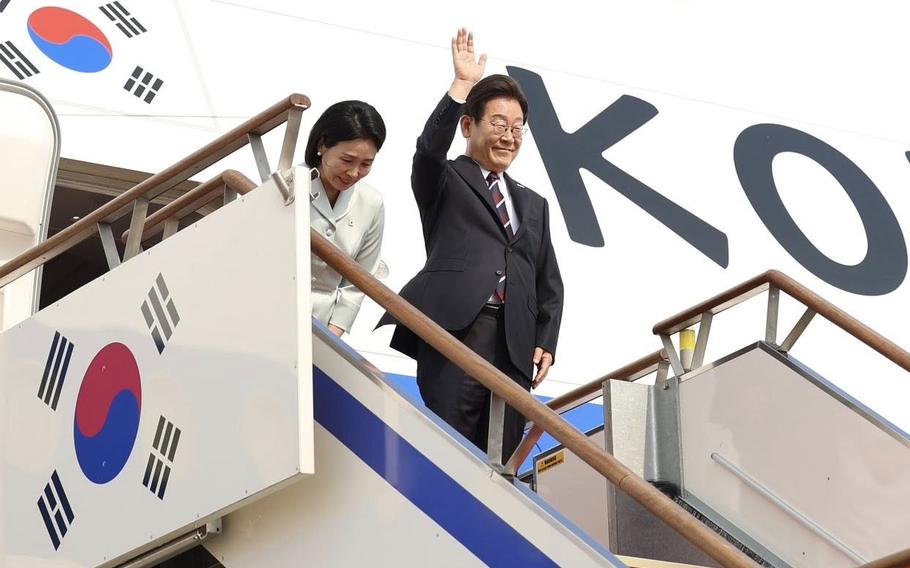
South Korean President Lee Jae-myung and his wife, First Lady Kim Hye-kyung, board a plane from Seoul Air Base to Canada for the G7 summit on June 16, 2025. (Lee Jae-myung)
CAMP HUMPHREYS, South Korea — Less than a month into his new administration, South Korean President Lee Jae-myung has reversed some of his predecessor’s North Korea policies, a sign of more changes to come for two countries technically still at war, according to experts.
Lee, of the Democratic Party, was inaugurated June 4 to replace Yoon Suk Yeol, a member of the conservative People Power Party impeached after a short-lived martial law attempt six months earlier.
During his campaign, Lee contrasted himself with Yoon, who took a hard line toward North Korea. Lee argued that with a softer stance toward the North, the two countries could develop amiable relations and finally achieve peace on the Korean Peninsula.
South Korean progressives typically favor engaging North Korea through dialogue and economic ventures, rather than trading threats, Andrei Lankov, a Korean Studies professor at the Seoul-based Kookmin University, said by phone Monday.
One week after taking office, Lee silenced the military’s propaganda loudspeakers aimed at North Korea. The loudspeakers along the 160-mile border with the North broadcasted a range of media intended to vex the communist regime, such as news and pop music from the South.
North Korea responded the same evening by silencing its own border broadcasts, according to the South’s military at the time.
“For North Korea, it seems negative for their soldiers if they keep broadcasting,” Korea University North Korean politics professor Lim Jae-Cheon said by phone Thursday. “I think that is why they stopped broadcasting; it’s not bad for them. They stopped their broadcasting in response to our halt.”
Lee also directed the government to curb propaganda leaflets sent northward by balloon by activist groups in South Korea. The North characterized the balloons as an act of war.
The balloons that sometimes carry rice, small radios and other essentials to aid impoverished North Koreans hinder diplomatic relations between North and South and “threaten the daily lives and safety” of border-area residents, according to a presidential office statement June 14.
Previous attempts by former South Korean President Moon Jae-in to outlaw the practice have failed. The country’s Constitutional Court in 2023 ruled that Moon’s legislation violated freedom of expression.
In addition to preemptively lowering tensions, South Korea likely wants to send humanitarian aid to the North and for the Koreas to restart joint economic projects that withered with strained relations, according to Lankov.
However, these projects will come at a heavy price for Seoul, he added.
“From North Korea’s point of view, South Korea should always pay; North Korea should not give Seoul anything for free,” Lankov said.
The defunct inter-Korean rail lines that linked the two countries since 2018 are one of these ventures. North Korea blew up the rail lines on its side in October, after Kim described the South as its “primary enemy” and rejected the possibility of reunification.
South Korea loaned the North approximately $132 million for the project, which it has yet to repay, according to the South’s Ministry of Unification.
“When they are talking about exchanges … you discover that relations between the two Korean states have not ever been based on the reciprocity principle,” Lankov said. “Basically, South Korea was always losing money when trading with North Korea or investing in North Korea.”